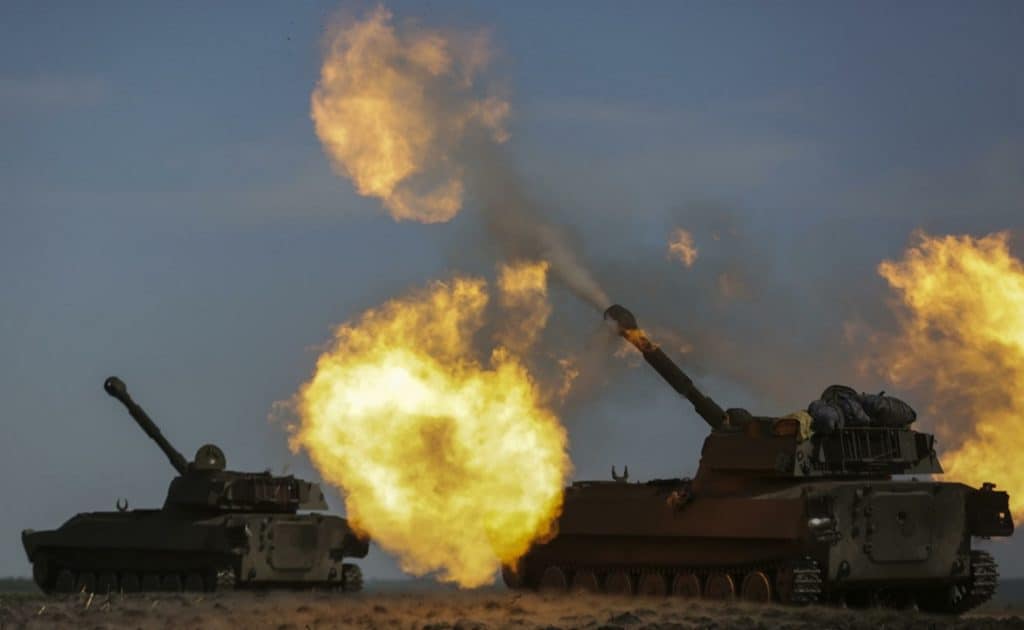By Nikola Mikovic
Although Russian officials claim that the “liberation” of the Donbass is Moscow’s “unconditional priority”, Russian Armed Forces proved unable to protect Donetsk and other cities in the region from constant Ukrainian shelling. At the same time, the Russian Army significantly reduced the number of missile strikes on Kyiv, while the Kremlin reportedly started making unilateral concessions to Ukraine and the West.

According to Russian President Vladimir Putin, Moscow will “guarantee peaceful passage to ships leaving Ukraine’s ports”, a move which will allow Kyiv to freely export its grains. Putin’s comments came after he met with Senegal’s President Macky Sall, who is also the current head of the African Union, and after the West pressured the Kremlin to lift the Black Sea blockade. In other words, Russia signaled that it is ready to make another “goodwill gesture”, even though policy makers in the West will undoubtedly interpret it as yet another Russian expression of weakness.
The very fact that Russia allows its opponent to export grains means that Moscow is indirectly helping the Ukrainian economy. More importantly, given that the US officials have in recent weeks been meeting regularly with their British and European counterparts to discuss potential frameworks for a ceasefire in Ukraine, it is entirely possible that the West will soon pressure Putin to sign a truce with Ukrainian President Volodymyr Zelensky. If the Russian leader agreed to unblock the Black Sea, it is very likely that he will also agree to temporarily end the conflict, which will allow Ukraine to get more Western-made weapons and prepare its army for a counteroffensive.
While the West continues arming Ukraine, Russian Armed Forces desperately lack both manpower and sophisticated weapons. According to Russian journalist and war correspondent Alexander Kots – critics would call him a propagandist – the Russian Army has quite a few reconnaissance drones.
“I’m looking at a narrow section of the front, and I see only two Orlan-10 and one Orlan-30 drones for our two armies. As long as they haven’t been shot down, it’s fine”, Kots said, pointing out that Ukrainian forces, unlike the Russian Army, have a lot of drones.
Russia also lacks modern communication systems, and its troops are often forced to use unsecured communication devices such as smartphones or push-to-talk radios. After China reduced the export of telecommunication equipment to Russia by 98 percent, Moscow will have a very hard time resolving this crucial problem.
Moreover, it will be very difficult for the Russian sanctions-hit economy to rebuild the Donbass. Russian experts estimate that Moscow would need $200-$300 billion to rebuild territories – namely the Donbass and certain parts of the Kharkiv region – that are currently under Russian control. Indeed, it is extremely unlikely that the Russian budget will be able to afford to invest so much money into the reconstruction of the self-proclaimed Donetsk People’s Republic and Lugansk People’s Republic, which means that many Donbass cities will remain devastated for the foreseeable future.
Besides the Donbass, villages and cities in Western Russia will also suffer heavy damage. Although in April Russia threatened to strike “decision-making centers” in Kyiv if Ukraine continues conducting strikes in the Russian Federation, to this day not a single administrative building in the Ukrainian capital has been hit. Ukraine, on the other hand, continues shelling the Russian territory, quite aware that the Kremlin does not intend to retaliate.
The West, for its parts, seems very confident that Moscow will not react if Ukraine receives artillery systems from NATO countries. Kyiv has reportedly promised Washington that it will not use advanced rocket systems supplied by the US to hit targets inside Russian territory. It is worth noting, however, that neither Ukraine nor the United States see Crimea as part of Russia. Thus, it is not improbable that Ukrainian Armed Forces will eventually use the US-made advanced rocket systems to strike Russian military bases and ships in Crimea, and wait to see if the Kremlin would react, or if Moscow just expressed its grave concerns over the incidents.
“If those types of weapons are used against the territory of Russia, the armed forces of our country will have no other choice but to strike decision-making centers”, said Deputy Chairman of Russia’s Security Council Dmitry Medvedev.
The coming weeks and months will show if Medvedev’s statement was just another empty threat, or if the Kremlin is willing to raise the stakes and escalate the conflict. One thing is for sure: over the past three months, Russia has clearly demonstrated that it cannot protect the Donbass and its own territory from shelling. Therefore, the West and Ukraine do not have many reasons to take the Kremlin too seriously.
Author: Nikola Mikovic (Journalist, researcher and analyst based in Serbia. He covers mostly the foreign policies of Russia, Belarus and Ukraine)
(The views expressed in this article belong only to the author and do not necessarily reflect the views of World Geostrategic Insights).
Image Credit: EPA/STR







